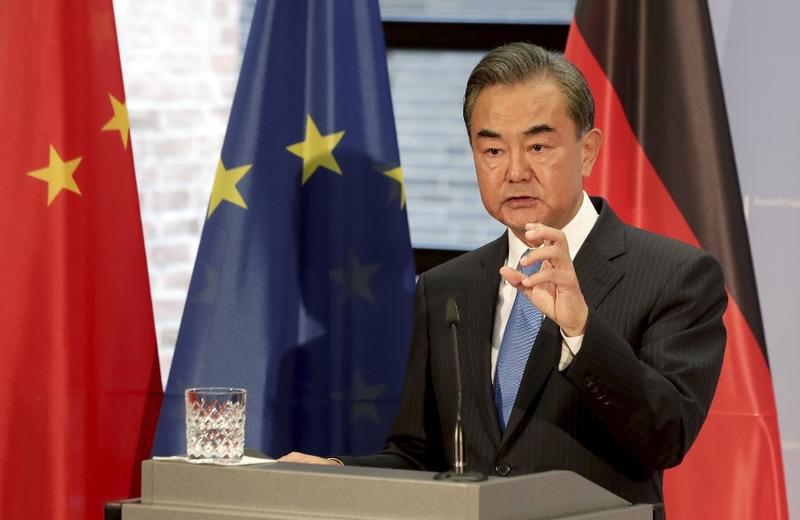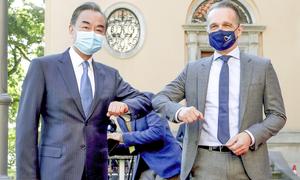 China's Foreign Minister Wang Yi addresses the media during a joint press conference with his German counterpart in Berlin, Germany, on Sept 1, 2020. (PHOTO / AFP)
China's Foreign Minister Wang Yi addresses the media during a joint press conference with his German counterpart in Berlin, Germany, on Sept 1, 2020. (PHOTO / AFP)
BERLIN - China and the European Union (EU) are facing an important opportunity to develop better bilateral relations and the two sides need to strive for progress in six areas, said visiting Chinese State Councilor and Foreign Minister Wang Yi on Tuesday.
Wang made the statements at a joint press conference with German Foreign Minister Heiko Maas, when answering a reporter's question over his expectations of the development of China-EU ties and cooperation.
This year marks the 45th anniversary of the establishment of diplomatic relations between China and the EU, and the first year of the new EU institutions. It is also an important year for Germany to assume its Presidency of the Council of the EU once again, said Wang.
Under the current circumstances, he said, China-EU relations face an important opportunity for further development.
China and the EU need to make preparations for China-EU high-level exchanges in the next stage, to chart the course for bilateral cooperation
First, the two sides need to make preparations for China-EU high-level exchanges in the next stage, to chart the course for bilateral cooperation.
Second, China and the EU should conclude within this year negotiations on the China-EU Comprehensive Investment Agreement, which have entered the final stage. Both sides need to step up their efforts and make political decisions when necessary so as to find a solution to the outstanding issues, he said.
Third, both sides should sign the China-EU 2025 Strategic Agenda for Cooperation as soon as possible, to provide blueprints and frameworks for dialogues and cooperation.
READ MORE: Wang Yi: China-US divergences not about power contest
Fourth, China and the EU should unswervingly advance international cooperation on climate change and take new actions to this end, Wang said, adding that China has already fulfilled its 2020 emissions reduction commitment two years ahead of schedule and is actively working on medium- to long-term targets.
 Chinese Foreign Minister Wang Yi (left) bumps ellbows with German Foreign Minister Heiko Maas as the two met in Berlin, Germany on Sept 1, 2020 as part of Wang's Europe visit. (PHOTO / AFP)
Chinese Foreign Minister Wang Yi (left) bumps ellbows with German Foreign Minister Heiko Maas as the two met in Berlin, Germany on Sept 1, 2020 as part of Wang's Europe visit. (PHOTO / AFP)
Fifth, China and the EU should also strengthen cooperation in the digital economy. Both sides have their own advantages and common concerns in developing the digital economy. "We should continue to open our markets to each other, strengthen cooperation in the technology industry and work for the formulation of standards, rules and regulations in the global digital field," he urged.
The Chinese foreign minister also said the two parties should uphold the core values and basic principles of the World Trade Organization, support the leadership and coordination role of the World Health Organization in helping countries overcome the COVID-19 pandemic
Finally, the two sides should also strengthen support for multilateral institutions, backing the central role of the United Nations, the Security Council in particular, in maintaining world peace and security, speeding up the implementation of the 2030 Agenda for Sustainable Development, Wang added.
The Chinese foreign minister also said the two parties should uphold the core values and basic principles of the World Trade Organization, support the leadership and coordination role of the World Health Organization in helping countries overcome the COVID-19 pandemic.
Three major tasks for Sino-German ties
The foreign minister also noted that today's world is faced with three crucial choices -- between multilateralism and unilateralism, between openness and seclusion, and between cooperation and confrontation.
The first major task for China and Germany, Wang said, is to promote global unity against the COVID-19 pandemic and facilitate world economic recovery.
To this end, both countries should continue supporting the work of the World Health Organization (WHO), and say no to erroneous words and deeds that are harmful to global cooperation against COVID-19, he said.
The second major task for China and Germany, Wang said, is to jointly make China-EU relations more stable and mature and lift bilateral ties to an even higher level.
READ MORE: Wang warns over Czech visit to Taiwan
Wang said China has high expectations for the development of China-EU relations during Germany's Presidency of the Council of the European Union in the second half of this year.
China-Germany and China-Europe share far more common interests than differences, and are partners rather than rivals, said the Chinese minister, adding China and Europe have different social systems and ideologies, but China is always opposed to the export of ideologies
Thirdly, the two countries should work together to practice multilateralism and oppose the waging of a "new Cold War," Wang said, adding that both countries are opposed to the instigation of confrontation and will strengthen cooperation among multilateral institutions, as well as support the United Nations, the WHO and multilateralism.
China-Germany and China-Europe share far more common interests than differences, and are partners rather than rivals, said the Chinese minister, adding China and Europe have different social systems and ideologies, but China is always opposed to the export of ideologies, let alone competition of social systems.
ALSO READ: Wang: Lies, rumors about China bound to be disproved by facts
Non-interference in internal affairs
The minister cited concrete numbers and facts to show why the Law of the People's Republic of China on Safeguarding National Security in the Hong Kong Special Administrative Region is justified, as well as the positive outcome of the de-radicalization measures in Xinjiang, adding that these policy measures are widely supported by the Chinese people.
Wang said that during his current visit to Europe, some of his local colleagues inquired about Hong Kong and Xinjiang affairs, but they all first stressed their respect for China's sovereignty and that they had no intention to interfere in China's internal affairs.
The principles of mutual respect and non-interference in each other's internal affairs are not only basic principles of international relations, but also the fundamental rules of the Charter of the United Nations, and thus should be strictly followed, he noted.
Based on such a premise, China is willing to exchange views on issues of mutual concern with countries that are interested in the issues mentioned above, with the aim of enhancing mutual understanding, Wang added.


